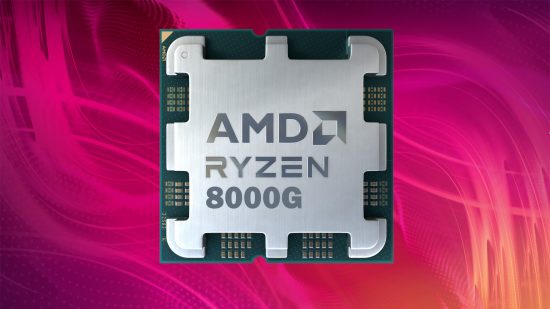The next set of AMD AM5 desktop processors is poised to be the AMD Ryzen 8000G series, according to a Taiwanese motherboard manufacturer. Although these CPUs will share the same Zen 4 microarchitecture as their 7000 series counterparts, there are a couple of key differences between the two that are worth getting excited about.
Currently, the potential specs of four potent AMD SKUs have leaked. The Ryzen 7 8700G appears to be the best CPU of the bunch, with the Ryzen 5 8600G, Ryzen 5 8500G, and Ryzen 3 8300G rounding off the rest of the stack.
Here are rumored the AMD Ryzen 8000G series specs:
| CPU | Cores / Threads | Compute Units |
| Ryzen 7 8700G | 8 (Zen 4) / 16 | 12 (RDNA 3) |
| Ryzen 5 8600G | 6 (Zen 4) / 12 | 8 (RDNA 3) |
| Ryzen 5 8500G | 2+4 (Zen 4+4c) / 12 | 4 (RDNA 3) |
| Ryzen 3 8300G | 1+3 (Zen 4+4c) / 8 | 4 (RDNA 3) |
If the specs put forward by HKEPC hold water, it seems that AMD is aiming to debut its recently launched Zen 4c cores to desktop PCs. This new hybrid core makeup should translate into cheaper, more power-efficient chips that offer comparable performance to CPUs with full fat Zen 4 cores, explaining the appearance of a Ryzen 3 processor.
Elsewhere, AMD is finally boosting the capabilities of its iGPUs, as is to be expected from Ryzen ‘G’ CPUs. The degree of this improvement, however, greatly varies depending on the processor in question. All the chips listed above pack more RDNA 3 CUs than even the Ryzen 9 7950X, but while the 8700G boasts six times the amount (12), the 8300G has just double (4). For context, the Ryzen 5 5600G and Ryzen 7 5700G have seven and eight RDNA 2 CUs, respectively.
How well these APUs can replace the best graphics cards available to budget builders, remains to be seen. That said, we’re glad to see the return of the Ryzen 3, with it still being conspicuously absent from the Ryzen 7000 series.
Are you excited to build a PC with an AMD Ryzen 8000G processor? Let us know your thoughts on the Custom PC Facebook page, via Twitter, or join our Custom PC and Gaming Setup Facebook group and tap into the knowledge of our 400,000+ members.
